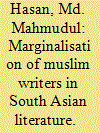|
|
|
Sort Order |
|
|
|
Items / Page
|
|
|
|
|
|
|
| Srl | Item |
| 1 |
ID:
145667


|
|
|
|
|
| Summary/Abstract |
In the Western political science literature of the late 20th and early 21st century, the Middle East has often been described, not only as authoritarian, but also as impervious to democracy. Institutional, structural, and cultural explanations were advanced to explain this democracy deficit. This article will debunk the notion that democratization in the Middle East is limited by entrenched Muslim and/or Islamist views on social and sexual mores, and on women’s political and social rights. Indeed, the events of the so-called “Arab Spring” have shown that the desire for democracy is the reason for the overthrow of several regimes in the Arab world. These popular-led regime changes were triggered by a desire for political and social reform. The main actors behind the Arab uprisings have been Arab youths and women, with women actively participating in anti-regime demonstrations and sometimes paying the price for that participation with their bodies. Using examples mainly from North Africa, the article will show three trends that have emerged in the region since the 1990s: changes in the law proposed by grassroots secular activists, the work of Muslim feminists, and that of Islamist female activists in the transformation of women’s roles in the Middle East that counter the claim that Islamic views on gender equality limit the emergence of democracy.
|
|
|
|
|
|
|
|
|
|
|
|
|
|
|
|
| 2 |
ID:
117598


|
|
|
|
|
| Publication |
2012.
|
| Summary/Abstract |
This article argues that there appears to be a pattern of disregarding the literary contributions of South Asian Muslim writers who produced English texts on a variety of topics. It then mainly contextualises Rokeya Sakhawat Hossain's English works in the tradition of South Asian writing in English to identify a continuous trend of undervaluing Muslim literary contributions in English in the region. The article thus argues for a re-assessment of the evaluation of this literary tradition, so that the many forgotten South Asian Muslim writers in English, including Rokeya, regain their long overdue recognition.
|
|
|
|
|
|
|
|
|
|
|
|
|
|
|
|
| 3 |
ID:
187007


|
|
|
|
|
| Summary/Abstract |
This article shows the different themes but also change of perspectives and approaches that Mernissi dealt with or underwent over the years. It examines the trajectory and impact of her arguments, especially from a critical standpoint. It sheds light on her religious approach and its bearing on Islamic and Moroccan feminisms. The latter approach does not explain the complexity of the link between women’s status and the socio-political context in a Muslim-majority country like Morocco, nor does it provide an answer to women’s problems and aspirations. Using the intersectionality theory, I claim that, to challenge patriarchy and foster gender equality and women’s empowerment, the alternative approach is to think beyond Islam, by arguing that Moroccan women’s roles are shaped by a variety of intersecting factors, namely post-colonial thinking, demographic change, nationalism, poverty, and the progressive shift to a modern society. Adopting the Universal Declaration of Human Rights and The Convention on the Elimination of All Forms of Discrimination against Women (CEDAW), first promulgated in 1979 by the UN General Assembly, and often described as an international bill of rights for women, is also part of this alternative human rights approach.
|
|
|
|
|
|
|
|
|
|
|
|
|
|
|
|
| 4 |
ID:
160378


|
|
|
|
|
| Summary/Abstract |
This article analyses how second-generation Moroccan women are integrating new ways of understanding Islam and morality into their everyday. The study is based on ethnographic research and on the life stories of young Moroccan women who attend Spanish universities. The author explores the concerns that these students share in a context in which being a Muslim woman can lead to situations of inequality and discrimination within their own intragroup, namely their families and members of the Moroccan community, as well as the non-Muslim members of Spanish society. The study reveals how the participation of these women in higher education promotes the appropriation of a discourse related to Islamic feminism. As a result of this appropriation they are able to negotiate new interpretations of religious practice and meanings of moral norms, which they integrate into their everyday world. From this perspective the study reveals the way that these young women try to construct a more inclusive identity as Muslim women living in Spain.
|
|
|
|
|
|
|
|
|
|
|
|
|
|
|
|
|
|
|
|
|